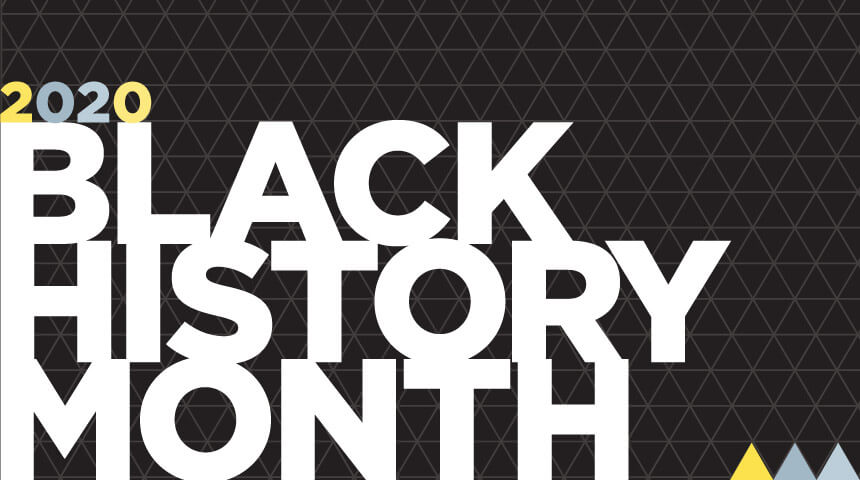The 2020 National theme for Black History Month is “African Americans and the Vote” marking the 150th anniversary of the Fifteenth Amendment which granted the right to vote to Black men after the Civil War. Through stories that illustrate the important history of voting rights and civil rights teens in grades 9-12 can learn about the Civil Rights Movement and the monumental Voting Rights Act of 1965 in an interesting and exciting way. Titles also include stories about relevant subjects such as protests, social justice, and racial injustices and issues and modern-day voting issues and information.
Teen Non-Fiction Titles
Turning 15 on the Road to Freedom: My Story of the Selma Voting Rights March
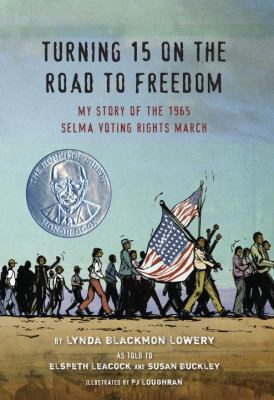
A memoir of the Civil Rights Movement from one of its youngest heroes, Lynda Blackmon Lowery. Jailed nine times before her fifteenth birthday, Lowery fought alongside Martin Luther King, Jr. for the rights of African Americans. In this memoir, she shows today’s young readers what it means to fight nonviolently (even when the police are using violence, as in the Bloody Sunday protest) and how it felt to be part of changing American history.
Because They Marched: The People’s Campaign for Voting Rights That Changed America
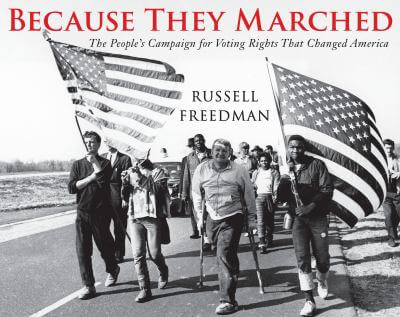
To commemorate the 50th anniversary of the 1965 Voting Rights Act, Russell Freedman has written an account of the historical march from Selma to Montgomery, Alabama that led up to the landmark decision. This thorough account is accompanied by more than forty photographs of the march.
March Book One March Book Two March Book Three
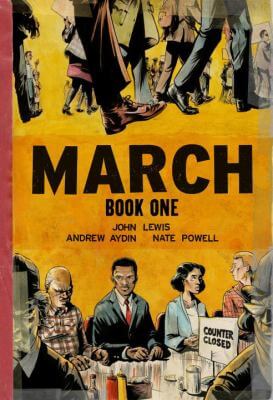
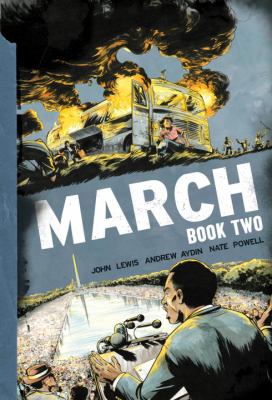
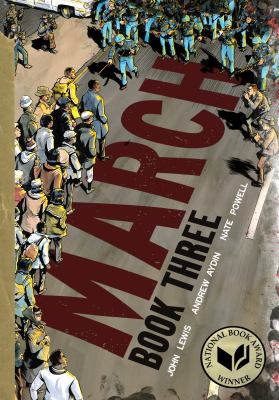
The March Trilogy is a vivid first-hand account of Congressman John Lewis’ lifelong struggle for civil and human rights, meditating in the modern age on the distance traveled since the days of Jim Crow and segregation in graphic novel format. Rooted in Lewis’ personal story, it also reflects on the highs and lows of the broader civil rights movement.
Book One spans John Lewis’ youth in rural Alabama, his life-changing meeting with Martin Luther King, Jr., the birth of the Nashville Student Movement, and their battle to tear down segregation through nonviolent lunch counter sit-ins, building to a stunning climax on the steps of City Hall.
Book Two follows the success of the Nashville sit-in campaign, and John Lewis is more committed than ever to changing the world through nonviolence – but as he and his fellow Freedom Riders board a bus into the vicious heart of the deep south, they will be tested like never before. Faced with beatings, police brutality, imprisonment, arson, and even murder, the movement’s young activists place their lives on the line while internal conflicts threaten to tear them apart.
Book Three opens with the bombing of the Birmingham Baptist Church and by the fall of 1963, the Civil Rights Movement has penetrated deep into the American consciousness. Through relentless direct action, SNCC continues to force the nation to confront its own blatant injustice, but for every step forward, the danger grows more intense: Jim Crow strikes back through legal tricks, intimidation, violence, and death. The only hope for lasting change is to give voice to the millions of Americans silenced by voter suppression: “One Man, One Vote.”
Steal This Country : A Handbook for Resistance, Persistence, and Fixing Almost Everything
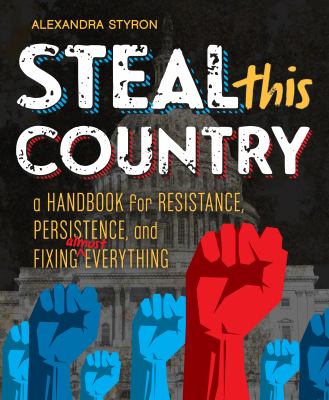
A how-to guide on social and political activism for tweens and teens. This handbook includes insight into the history of activism and civil disobedience in America along with advice on why activism mattered then and still matters today. Key issues and themes include racial justice, LGBTQIA+ rights, climate change, and women’s rights.
One Person, No Vote : How Not All Voters are Treated Equally : A Young Adult Adaptation
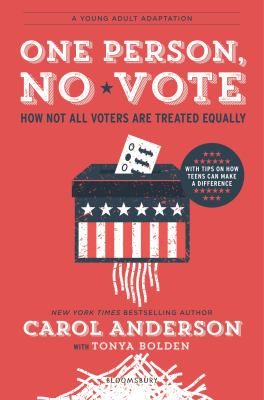
An adaptation of Carol Anderson’s One Person, No Vote aimed at teens. In this young adult adaptation Anderson discusses the history of African Americans and voting in America including the Voting Rights Act of 1965 and the modern disenfranchisement of black voters. Anderson discusses current voter suppression works from photo ID laws to gerrymandering to poll closures and how current voter suppression rolled back the very protections the Voting Rights Act of 1965 had promised to uphold. The book concludes with exploring the resistance movement that seeks to restore the basic right to vote to all Americans in preparation for the 2020 election.
We Are Not Yet Equal : Understanding Our Racial Divide
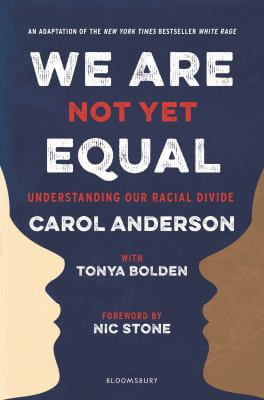
A young adult adaptation of Carol Anderson’s White Rage that examines the racist backlash that occurs after America achieves a milestone of progress toward full and equal black participation in democracy such as the Civil Rights Act of 1964 and the Voting Rights Act of 1965. This adaptation provides readers with additional historical context to the events noted throughout the text as well as photographs and resources for teens.
Stolen Justice : The Struggle for African-American Voting Rights
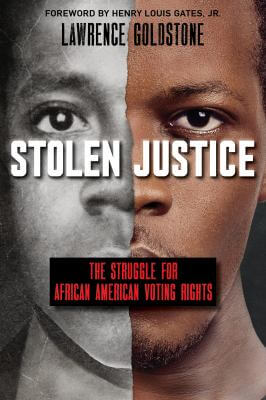
A thrilling and incisive examination of the post-Reconstruction era struggle for and suppression of African American voting rights in the United States. Following the Civil War, the Reconstruction era raised a new question to those in power in the US: Should African Americans, so many of them former slaves, be granted the right to vote? In a bitter partisan fight over the legislature and Constitution, the answer eventually became yes, though only after two constitutional amendments, two Reconstruction Acts, two Civil Rights Acts, three Enforcement Acts, the impeachment of a president, and an army of occupation. Yet, even that was not enough to ensure that African American voices would be heard, or their lives protected. White supremacists loudly and intentionally prevented black Americans from voting — and they were willing to kill to do so. In this vivid portrait of the systematic suppression of the African American vote for young adults, critically acclaimed author Lawrence Goldstone traces the injustices of the post-Reconstruction era through the eyes of incredible individuals, both heroic and barbaric, and examines the legal cases that made the Supreme Court a partner of white supremacists in the rise of Jim Crow.
Votes of Confidence: A Young Person’s Guide to American Elections
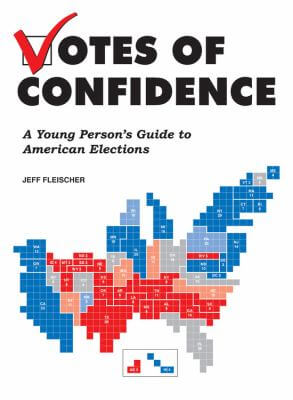
Every two years, media coverage of American elections turns into a horse-race story about who’s leading the polls and who said what when. This guide gives young adult readers clear explanations about how our election process actually works, why it matters, and how they can become involved. Using real-world examples and anecdotes, this book provides readers with thorough, nonpartisan explanations about primaries, the electoral college, checks and balances, polls, fundraising, and more.
Teen Fiction Titles

In 1959 Virginia, the lives of two girls on opposite sides of the battle for civil rights will be changed forever.
Sarah Dunbar is one of the first black students to attend the previously all-white Jefferson High School. An honors student at her old school, she is put into remedial classes, spit on and tormented daily.
Linda Hairston is the daughter of one of the town’s most vocal opponents of school integration. She has been taught all her life that the races should be kept “separate but equal.”
Forced to work together on a school project, Sarah and Linda must confront harsh truths about race, power and how they really feel about one another.
Boldly realistic and emotionally compelling, Lies We Tell Ourselves is a brave and stunning novel about finding truth amid the lies, and finding your voice even when others are determined to silence it.
I’m Not Dying with You Tonight
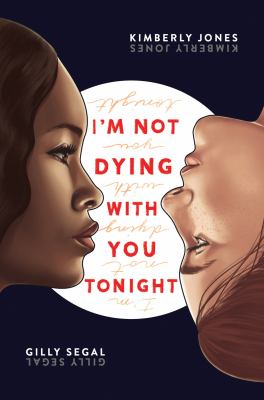
Over the course of one night, two girls with two very different backgrounds must rely on each other to get through the violent race riot that has enveloped their city.
Lena has her killer style, her awesome boyfriend, and a plan. She knows she’s going to make it big. Campbell, on the other hand, is just trying to keep her head down and get through the year at her new school.
When both girls attend the Friday-night football game, what neither expects is for everything to descend into sudden mass chaos. Chaos born from violence and hate. Chaos that unexpectedly throws them together.
They aren’t friends. They hardly understand the other’s point of view. But none of that matters when the city is up in flames, and they only have each other to rely on if they’re going to survive the night.
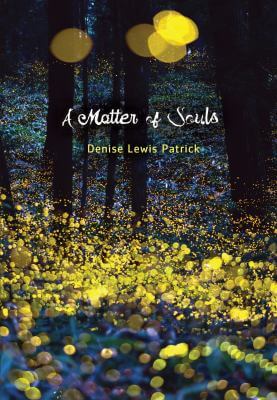
From the shores of Africa to the bowels of a transatlantic ship to a voting booth in Mississippi to the jungles of Vietnam, all human connection is a matter of souls.
In this stirring collection of short stories, Denise Lewis Patrick considers the souls of black men and women across centuries and continents. In each, she takes the measure of their dignity, describes their dreams, and catalogs their fears.
Brutality, beauty, laughter, rage, and love all take their turns in each story, but the final impression is of indomitable, luminous, and connected souls.

A hilarious and satirical novel about the highs and lows of the electoral process, proving that the popular vote is the one that matters most.

Sixteen-year-old Starr Carter moves between two worlds: the poor neighborhood where she lives and the fancy suburban prep school she attends. The uneasy balance between these worlds is shattered when Starr witnesses the fatal shooting of her childhood best friend Khalil at the hands of a police officer. Khalil was unarmed.
Soon afterward, his death is a national headline. Some are calling him a thug, maybe even a drug dealer and a gangbanger. Protesters are taking to the streets in Khalil’s name. Some cops and the local drug lord try to intimidate Starr and her family. What everyone wants to know is: what really went down that night? And the only person alive who can answer that is Starr.
But what Starr does–or does not–say could upend her community. It could also endanger her life.

X follows Malcolm Little, the man who would become known to the world as “Malcolm X” from his childhood to his imprisonment for theft at age twenty. This coming of age story, told by Malcolm’s daughter, follows the future civil rights leader from 1930 until 1948. It depicts a lifetime of turmoil and injustices that eventually lead Malcolm to find faith in the Nation of Islam and later become leader in the civil rights movement.

